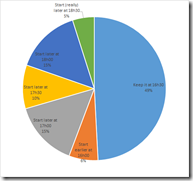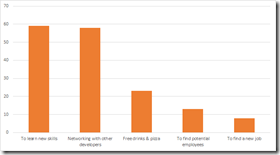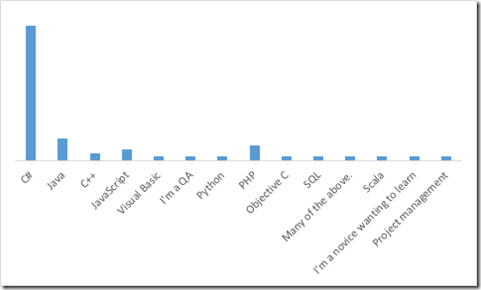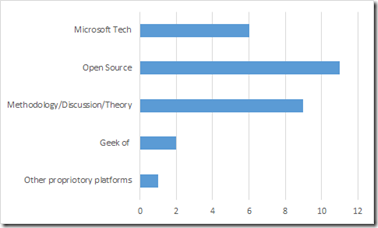This year we launched the first annual user group and let me say thank you to every single one of you for taking the time to help us improve the group. For this survey all questions were optional so you may see some differences in the numbers. This post is meant to share the data and I am not going to speculation about what this could mean or how we will adjust the group based on it at this point. Lets have a look at the data!
Comments
The final item in the survey is the first I want to discuss – the comments. Many where along the line of congratulations which is awesome but there are four I want to highlight here.
more code please, e.g. everyone has talked about 'everything must be unit tested', yet not once have i seen the actual code. I AM UNIT TESTING, BUT I FEEL THE COVERAGE IS NOT ENOUGH, SO IT WOULD BE HELPFUL TO HAVE A REAL LIFE EXAMPLE OF 100% COVERAGE REGARDING TEST DRIVEN DEVELOPMENT.
We will be having the awesome Martin Cronje in June doing a talk exactly on this! Another idea would be to attend the CodeRetreats where this is a major focus of the events. A personal comment based on the talks I have given; the time for a presenter is limited so if they are talking on SignalR adding unit tests not only takes time away from the talk but can also confuse the audience.
A suggestion to some of the discussions is to have a practical aspect where coders can code
I love the scenario where the audience can code with the talk but there are logistical reasons this doesn’t work well in our format. The presentation style is the one that works best.
Have more advice for novice/beginners to programming
Below I will talk about what type of events we run most often, and while the bulk of our talks are technology focused which can be very tough for novices we have a big chunk that are about methodologies, theories, stories and patterns. These are PERFECT for a novice since they share valuable information which doesn’t rely on technical understanding.
I haven't attended for some time due to other commitments, but for some time I thought it would be beneficial to have a bit more conversation / talks about the open-source languages and projects. I understand that the group was initially primarily started around Microsoft products, and that's great, but in my field open-source is more dominant. It's just an observation, though, nothing against the setup of the group per sé
I disagree with this view – having a look at our past events the break down of the sessions is as follows:
- Microsoft tech = sessions looking at something from Microsoft (examples: LightSwitch, Windows Phone).
- Open source = sessions looking at using an open source technology (examples: Git, Rails)
- Methodology/Discussion/Theory = these are talks where we discuss a theory, pattern, someone shares their learning's or methodology which is unrelated to a specific group (examples: Lesson From philosophy-Empirism vs Rationalism in system design, Responsible Programming)
- Geek of = these are our yearly December event where we have some fun.
- Other proprietary platforms = It isn’t open source, nor is it Microsoft (example: Developing for iOS)
- There are a few events which I have put into multiple brackets since. A great example is Bringing hipsterism and skinny jeans to .Net with ScriptCS. This is a talk which is both about Microsoft technology (C# & .NET) but focused on an open source technology building on top of it (ScriptCS).
Looking at the numbers – we are more about open source technology and developer improvement than Microsoft.
Overall, how satisfied or dissatisfied are you with the Developer User Group?
The first and most important was how satisfied or dissatisfied people are, on a scale from 1 to 5 (1 being bad – 5 being great) and we hit at an average of just over 4! ![]()
How likely are you to recommend the Developer User Group?
Second is very important for us, because we want to grow the group and being recommended is the best way for that. Here we did a scale from 1 to 5 and did even better scoring over 4.4!
Overall, how do you find the complexity of the sessions?
Third is how members are finding the content – with this also on a 1 to 5 scale with 1 being too simplistic content and 5 being too complex content. 3 is the just right spot and we came in almost exactly at that!
Start time
 The most discussed issue in the group is the start time – it is brought up almost every month in the comments. Keeping the time the same really smashed the other options, both individually and if you group the times into early (16h00 + 16h30), medium (17h00 + 17h30) and late (18h00 + 18h30). We are planning to use the early start time to allow for longer sessions with multiple topics going forward so hopefully that will enable people to get the best of both worlds.
The most discussed issue in the group is the start time – it is brought up almost every month in the comments. Keeping the time the same really smashed the other options, both individually and if you group the times into early (16h00 + 16h30), medium (17h00 + 17h30) and late (18h00 + 18h30). We are planning to use the early start time to allow for longer sessions with multiple topics going forward so hopefully that will enable people to get the best of both worlds.
- Keep it at 16h30: 49%
Start earlier at 16h00: 6% Start later at 17h00: 15% Start later at 17h30: 10% Start later at 18h00: 15% Start (really) later at 18h30: 5%
What do you hope to gain from the developer user group?
 The only item to allow multiple options to be selected, is also one of the most important – what do you want? Almost everyone said learning new skills and networking.
The only item to allow multiple options to be selected, is also one of the most important – what do you want? Almost everyone said learning new skills and networking.
- To learn new skills: 95%
- Networking with other developers: 93%
- Free drinks & pizza: 37%
- To find potential employees: 20%
- To find a new job: 12%
Age
 Moving into the demographics for the group – the first one is age with the majority between 26 – 35.
Moving into the demographics for the group – the first one is age with the majority between 26 – 35.
- 26 – 35:
75% 36 – 50: 16% 18 – 25: 6% 51 – 65: 1%
What is your level?
 The next item is the level, which shows a strong slant to the senior level.
The next item is the level, which shows a strong slant to the senior level.
- Senior:
70% Intermediate: 22% Junior: 6%
What is your primary programming language?
 The third demographic which is vital for us in planning content is around primary development language and we have a GREAT mix of languages but the strongest community is c#.
The third demographic which is vital for us in planning content is around primary development language and we have a GREAT mix of languages but the strongest community is c#.
- C#: 59%
- Java: 9%
- C++: 3%
- JavaScript: 4%
- Visual Basic: 1%
- I'm a QA: 1%
- Python: 1%
- PHP: 1%
- Objective C: 1%
- SQL: 1%
- Many of the above: 1%
- Scala: 1%
- I'm a novice wanting to learn: 1%
- Project management: 1%
What is your primary type of development work?
 In line with planning content, knowing what people are doing is vital. Web work (internal and external) is a strong lead followed by integration and mobile.
In line with planning content, knowing what people are doing is vital. Web work (internal and external) is a strong lead followed by integration and mobile.
- Mobile apps: 11%
- Internal web sites or Intranets: 30%
- Integration projects: 19%
- External/Public web sites: 27%
- Coaching: 1%
- UI/DB/Platform: 1%
- Many of the above: 1%
- Internal Projects: 1%
- I'm a Novice wanting to learn: 1%
- Server side development: 1%
- Data warehousing: 1%
Organisation size
 How big are the companies that developers come from? Here it looks like a strong split between small (less than 20) and large (more than 90). Which I think is pretty accurate for the industry as a whole in South Africa.
How big are the companies that developers come from? Here it looks like a strong split between small (less than 20) and large (more than 90). Which I think is pretty accurate for the industry as a whole in South Africa.
- >200: 25%
- 11-20: 8%
- 1-10: 29%
- 21-40: 12%
- 91-200: 14%
- 41-80: 9%
Role in purchasing?
 Finally, a question we can use when discussing with sponsors is what role people have in purchasing. Here there is some influence or none.
Finally, a question we can use when discussing with sponsors is what role people have in purchasing. Here there is some influence or none.
- None: 37%
- I can suggest/influence purchases: 51%
- I make the final say: 11%
Raw data?
Want the raw data – you can download it below.

